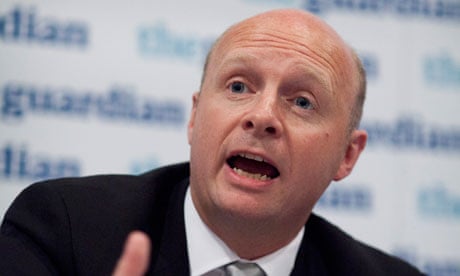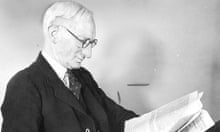It is reassuring to hear that Liam Byrne is "on the side of people who work hard and do the right thing". There aren't many in politics who are willing to say that. Rarer still is Byrne's recent bid to occupy the "centre ground". But mark where the centre ground lies.
The last Labour government, he suggests, "got it wrong … on immigration, on welfare, on control of banks". So it is on welfare that Byrne now seeks to map an agenda for a centrist Labour opposition.
Though opposing some cuts to disability benefits, he favours "reform" to reduce welfare spending. The solitary concrete proposal in this respect is to make the receipt of benefits, after a period of time, conditional upon attendance at a work or training centre: workfare, in other words. Yet, it is less the policy specifics than the ideological language framing his intervention that is arresting. He complains of soaring benefit costs, but blames this on social behaviour being skewed by the welfare state. Idleness and dependency on "unearned" income are the problem. This admixture of authoritarianism and free-market orthodoxy is very Thatcherite.
Byrne has form. He was elected in 2004 in a byelection in Birmingham Hodge Hill, following a campaign, managed by Tom Watson, whose disgrace notes were a pledge to "smash teen gangs" and stop benefits for "failed asylum seekers". The broad thrust of it was that Labour was "tough" and "on your side", while the Liberal Democrat opponents were "wimps" and on the side of asylum seekers and criminals. Byrne was elected, though Labour's electoral bloc was cut from 64% to 37%.
More specifically, the tenor of his latest intervention fits into a wider Labour strategy of articulating a politics of the "squeezed middle". In Miliband's bland cadences, this sounds anodyne. But, in fact, it is a strategy taken over directly from rightwing populism. To understand this, one need only revisit the rightist backlash against social democracy and New Deal liberalism. This had a racist component, visible in the seemingly evanescent campaigns of Enoch Powell and George Wallace. But race wasn't all there was to it, and the techniques of populist mobilisation continued to be deployed long after these two had passed into obscurity.
Rightwing populism is not merely transparently "representative": rather it seeks to create the division that it articulates. Societies divided along multiple lines are simplified into a dichotomy between "the people" and its other. The working class is redivided into the hard-working taxpayer and the slothful undeserving poor, with the former subsumed into the "people", the latter into its other. The people are then construed as a "middle" whose sovereignty has been abused by bureaucrats, tax-avoiding plutocrats, criminals, protesters and clamourous minorities alike. Thus, Wallace complained that "middle America" was squeezed between the "silk-stocking crowd" and the poor and criminal.
The "middle", thus defined, is a depthless discursive entity: "the people" supposedly bracketed by the term share little by way of work, culture, housing, education or daily experience. They are united only by what they oppose. Nonetheless, this type of appeal would underpin Ronald Reagan's attempt to forge a Republican majority. In the same way, Powellism would pass into mainstream politics in the form of Thatcherism, which championed a squeezed "middle England" of hard workers against a bossy state and the grasping poor: a form of politics characterised by Stuart Hall as "authoritarian populism". Since then, capturing the "centre ground" has often meant genuflecting to an incorrigibly reactionary "middle".
Byrne's "middle" is one that despises welfare recipients, immigrants and bankers with equal force. Like that of Wallace and Thatcher, his "middle" comprises the "productive" members of society opposed to the "unproductive", the parasites living on "unearned" income. Of course, Byrne is not simply a Thatcherite, much less a Powellite. It is sensible to assume that his articulation of rightwing populism is a conscious strategy intended to maintain social democracy as a viable electoral bloc in the coming decades. And purely on the basis of opinion polling, it may be tempting to believe that he has a correct, if ruthless, instinct.
Yet, what Labour says shapes the ideological terrain in which it works. New Labour's triangulations ended up reinforcing rightwing beliefs and drove public opinion sharply to the right over the last decade. The major beneficiary of this has not been Labour, far less the constituencies that Labour ostensibly exists to serve. In the long run, it has reinforced the breakdown of party identity: far from moulding a "people" with solid social democratic instincts, it has enhanced the fragmentation of the electorate into localised geographical or sectional enclaves. Labour's strategy is a gift to the right, and particularly to any fire-breathing rightist that can occupy the Tory leadership after the weak Cameron interregnum.





